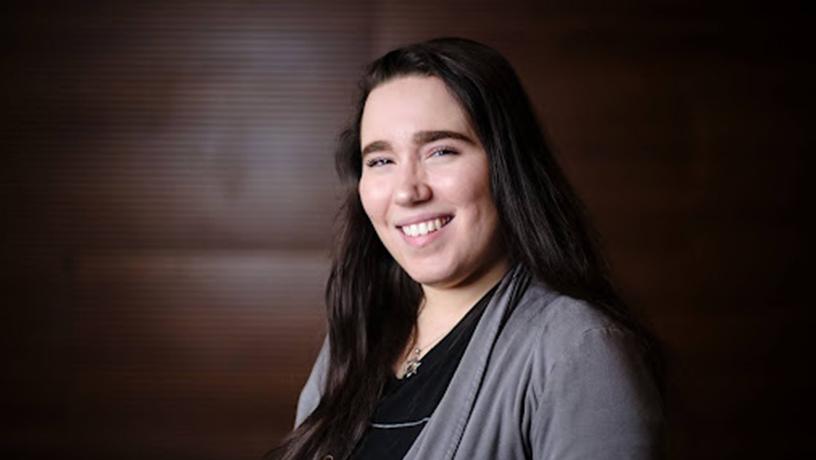A Student’s Journey on the Bridge to PhD Program
Columbia’s Bridge to PhD program supports Eden Shaveet in her journey as a public health infodemiologist.

Eden Shaveet
Eden Shaveet is about to ”graduate” as a public health infodemiologist from Columbia Engineering’s Bridge to PhD Program, designed to support students who’ve encountered barriers on their path to a graduate education in STEM. Shaveet, who holds an MS in health informatics and analytics from the Tufts University School of Medicine (TUSM), is the first Bridge Scholar taken on by the Department of Computer Science.
Interest in infodemiology
While at Tufts, she maintained one of the highest GPAs in the TUSM program and won their 2023 Health Informatics and Analytics Academic Achievement award. A faculty member there mentioned “infodemiology” to Shaveet in passing and she was instantly intrigued. While she was already interested in epidemiology and information science, she’d never considered that the two fields could overlap.
Shaveet’s path to graduate school has been far from traditional. She completed secondary school through the Gateway to College program and received her BA with honors in psychology and behavioral health. During clinical internships as an undergraduate, Shaveet found herself gravitating more towards databases and decided to pursue informatics.
Coming to Columbia
Shaveet came to the Bridge to PhD Program in STEM to hone in on her computational skill set. She was already trained as a health informatician, but she recognized that pursuing computer science research and coursework as a bridge scholar would not only enhance her skills as an interdisciplinary informatician but also increase her competitiveness as an applicant for PhD programs in informatics and information science. She knew that the Bridge program catered to people like her -- those who came from nontraditional educational backgrounds or have been historically underrepresented in their fields. Being offered a spot in the program has been one of the most fulfilling training experiences of her life.
“The Bridge to PhD Program is an exceptional program led by exceptional people that cultivates capable and successful academics,” Shaveet said. “I'm lucky to be a part of it.”
Shaveet didn’t arrive at Columbia Engineering with a comprehensive background in computing -- she saw herself as a potential public health practitioner. But during her first hackathon, her team won the first-place Patient Safety award through the Patient Safety Technology Challenge, alongside this reporter’s team, at the 2023 DivHacks Hackathon—an unexpected feat, she admitted. After taking courses in computer science and conducting computational research, Shaveet feels like this is where she is meant to be: “It’s what has kept my attention.”
Using data to explore food-poisoning outbreaks
And now her specialty at Columbia has become just that: public health infodemiology. Her work is focused on using publicly available data from sources such as social media and discussion forums to explore outbreaks of food-borne illnesses. She appreciates that “at Columbia, it’s not just hobbyists” who are interested in this work, but researchers who are integrating it into public health departments, including the New York City Department of Health and Mental Hygiene and the Los Angeles County Department of Public Health.
Shaveet is working with Computer Science Professors Luis Gravano and Daniel Hsu on the Adaptive Information Extraction from Social Media for Actionable Inferences in Public Health team. She describes the research as “grounded in the idea that we can augment current methods in public health needs assessments and passive syndromic surveillance using…anywhere people congregate and self-disclose information that we can translate into a health status signal for a population.”
Next up? A PhD
Shaveet applied to a range of PhD programs while finishing up her studies, received several offers, and has recently accepted a place in Cornell’s PhD program in information science with a graduate minor in computer science. She’s not going far -- she’ll be based on the Cornell Tech campus on Roosevelt Island.
Shaveet credits the Bridge program for preparing her in ways that she didn’t expect and that she is very grateful for. “I really didn’t expect to be applying to PhD programs in computer science and informatics!” she said. A major confidence builder has been winning the National Science Foundation (NSF) Computer and Information Science and Engineering Graduate (CSGrad4US) Fellowship, which will fund three years of her PhD anywhere she decides to go.
Richard Hagen, the director of the Bridge to PhD Program, praised Shaveet’s stellar performance in the program: “Eden truly embodies the essence of the Bridge to PhD program at Columbia with her outstanding accomplishments and the prestigious grant she received. I am incredibly proud of her and excited to witness her continued success in higher academia.”
The Bridge to PhD at Columbia
Columbia Engineering’s Bridge to PhD Program features intensive research, academic, and mentoring experiences for post-baccalaureates seeking to strengthen their applications for graduate school and to prepare for the transition to a PhD student. Recent alumni have gone on to PhD programs at Columbia University, the University of Chicago, the University of Wisconsin, Harvard University, Johns Hopkins University, and Princeton University. Several recent alumni have also received prestigious awards from the NSF, including the Graduate Research Fellowship Program.
